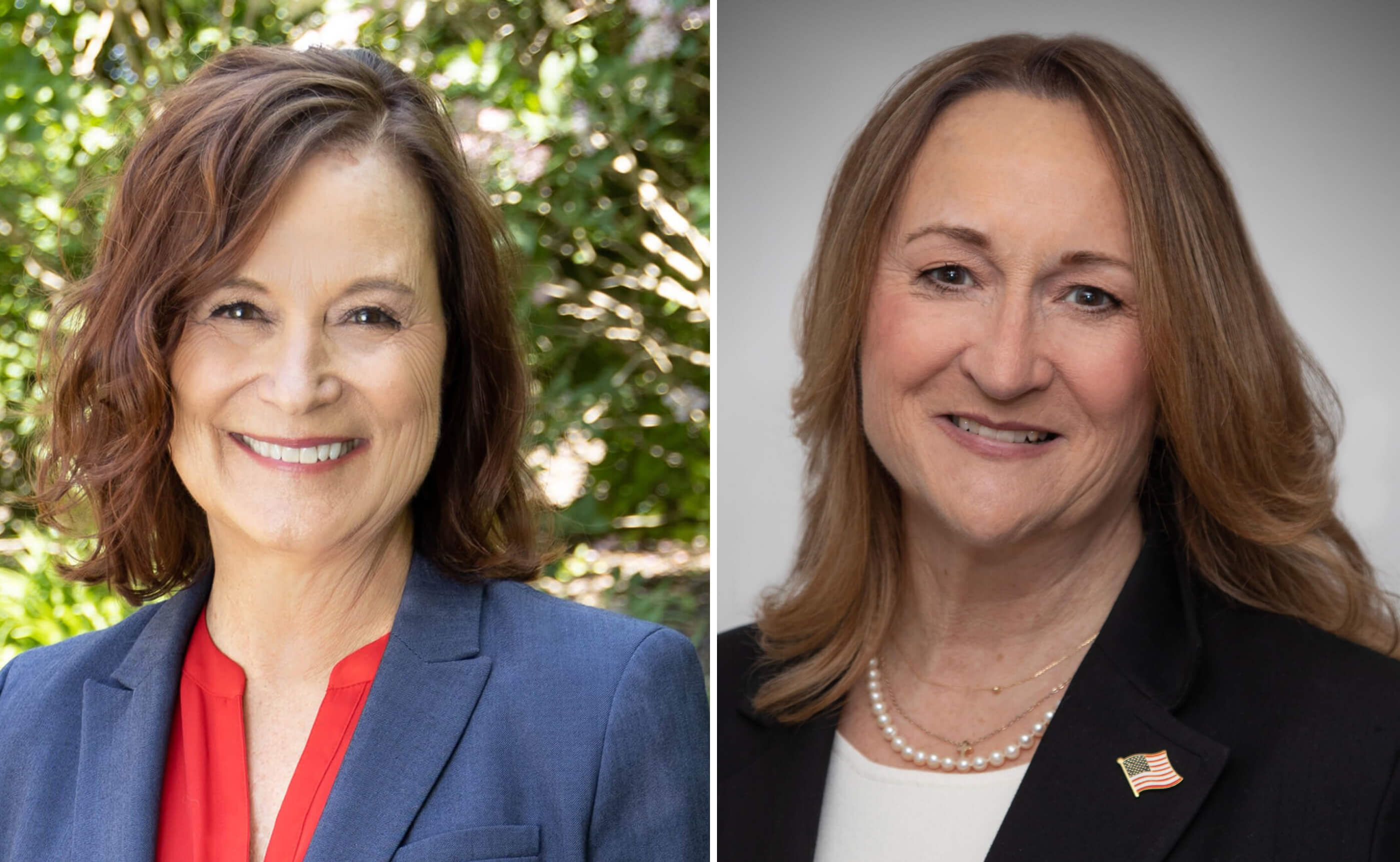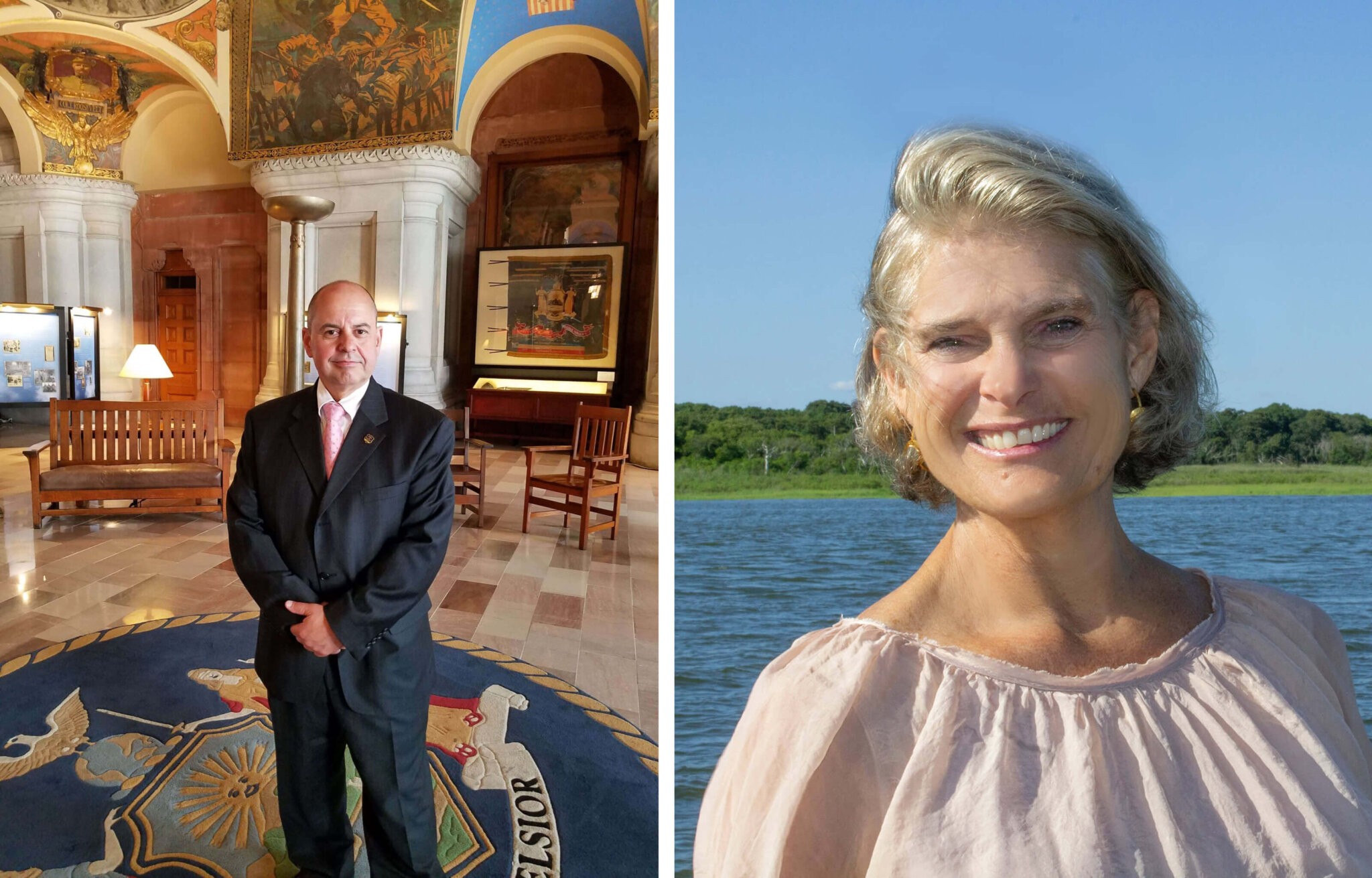Elections 2023: East End Suffolk County Legislator Candidates Sound Off

East End residents will elect two new Suffolk County legislators for the first time in about a decade this coming Election Day.
In Suffolk County Legislative District 1, which covers the North Fork, incumbent Legislator Al Krupski (D-Cutchogue) is stepping down to run for Southold town supervisor, setting up “The Battle of the Catherines.”
Vying for Krupski’s seat are Republican Catherine Stark, an aide to Krupski and a former chief of staff to current Southampton Town Supervisor Jay Schneiderman when Schneiderman served as a Suffolk County legislator earlier in his career.
Stark’s opponent is Democrat Catherine Kent, a former educator and former member of the Riverhead town board.
In Suffolk County Legislative District 2, which covers the South Fork, Democrat Ann Welker and Republican Manuel Vilar Jr. are vying for the seat being vacated by Legislator Bridget Fleming (D-Noyac), who has opted not to seek a fifth term.
Welker was elected to the Southampton Town Board of Trustees in 2017, when she became the first woman to hold a Trustee position since the Board’s inception in 1686.
Vilar is a retired state parks police officer, a former police union president and chairman of the East Hampton Town Republican Committee.
The candidates weighed in on the biggest challenges facing their districts and their qualifications for the position.
Talking with Suffolk County Legislator Candidates
DISTRICT 1
What do you feel are some of the most important issues affecting your district?
Catherine Stark: Land preservation and water quality are two of the most important issues. And one depends on the other. When we preserve open space, we are naturally contributing to clean water by not developing that land and having that water filter down to our aquifer.
Between 2009 and 2012, when I worked as chief of staff for (then-Suffolk County) Legislator Jay Schneiderman, I was involved in preserving over 700 acres of both farmland and open space on the East End. And in the 1st District over the last 10 years, I’ve helped to preserve over 1,125 acres.
When it comes to preservation, you have to have a willing seller. A lot of people don’t realize that Suffolk County doesn’t pursue landowners. The landowners come in and say, “You know I have this 50 acres of wooded land and I would love to see it preserved for open space.” That’s when we can be the most effective.
Catherine Kent: Protecting our air and water and fighting for the protection of open space and farmland are really important in my district. Last week, I spent a lot of time meeting with a representative from the Farm Bureau and talking about ways to address some of our most important issues. The North Fork is still very much a farm area and we want to keep it that way.
As soon as I announced my candidacy in the spring, I started going to every civic meeting I could locate in my district. At those meetings, affordable housing always comes up. It’s one of our most important and most complicated problems.
District 1 residents and business owners often cite the need for affordable housing as one of their top concerns. What’s the best way to think about that problem?
Catherine Stark: We can give county support to developers who agree to create affordable housing as a percentage of a total project. And the affordable units have to remain affordable for a period of 20 or 30 or 40 years, or sometimes in perpetuity. We’re working on that kind of legislation. But these developers are businesspeople and they have a right to make a profit. There has to be a happy medium between the developers’ needs and the needs of the county.
There’s a proposal on the North Fork — I can’t say who it is specifically — but in their plan, they’re talking about creating their own workforce housing as a built-in aspect of the project. I also know more than one restaurant owner who rents houses for his staff during the summer. I don’t think these business owners have a choice. The housing just isn’t there.
Catherine Kent: If you look at our district, we have affordable housing in some areas and not in others. So it’s not a cookie cutter fix. I always believe in bringing everyone to the table and hashing things out.
As a Suffolk County legislator, you can advocate in Albany for more funding for affordable housing. You can work with all the towns and be an advocate for smart projects.
I found as a councilperson that developers are willing to work with you. Sometimes it’s just a simple ask. Obviously, developers want to make a return on their investment, but they also want to have good, smart projects. We live in such a delicate area and we have so many people wanting to come out here right now that we have to have strong leadership on this.
What aspects of your background and personal life experience do you feel most qualify you for the office of Suffolk County legislator?
Catherine Stark: I’ve been doing the job for 27 years. I started with the clerk at the legislature. I worked in the office of real property tax services for a period. I worked for Robert Gaffney when he was county executive. I worked for (then-) Legislator Schneidermann as his chief of staff and then for the last 10 years I worked for Legislator Krupski.
Over those years, you develop relationships with people in various departments. I tell people that I don’t have all the answers, but I do have a lot of them. And I consider it a good day when I learn something new. If I don’t know the answer to a question, I know who to call to get that answer. I feel confident in saying that I can call any commissioner and not only will they take my call, they’ll talk to me. It took me a while to get to that point.
Catherine Kent: I think my style of working is very important. As an elected official, I answer to the people. And I kept that in mind with everything I did when I served on the town board of Riverhead. For example, I put together the Downtown Revitalization Committee, which helps steer the development of Riverhead’s downtown. I made sure that everyone was represented at the table — business owners, community people, planners. And when we did large forums to get input from the community, I worked very hard on outreach. Everybody had the ability to weigh in.
I grew up on the North Fork; I taught about 1,000 students out here (from Kindergarten through 4th grade). As a teacher, you don’t just get to know your students, you get to know their whole families.
Suffolk County legislator is a local office. However, the dysfunction and partisanship in Washington, D.C. is at a fever pitch right now. If you were running a political party at the national level, what advice would you give your colleagues?
Catherine Stark: You need to go into a room, sit down and talk it out and don’t leave until you’ve come to a compromise. It’s absolutely possible. You can’t just say that you’re not going to work with someone just because they’re a Republican or just because they’re a Democrat. Because after you’re elected, it doesn’t matter what letter is next to your name. You work for your constituents no matter who they are.
Catherine Kent: If there’s one thing we can all agree on, it’s that our country is very divided right now. The only thing that’s going to really change things is if we elect people that are active listeners. What we see a lot of right now are people in government just talking at each other and not actually listening to what the other person has to say.

DISTRICT 2
What do you feel are some of the most important issues affecting your district?
Ann Welker: One of the things that is most concerning to me is the critical importance of water quality in our community. Not just the quality, but also the quantity of our drinking water.
It was appalling to me as a resident of this coastal community when the Suffolk County legislature voted down the Suffolk County Water Quality Restoration Act in July. That would have given the voters the opportunity in November to increase Suffolk County tax by a very small percentage in order to fund a continuing revenue stream for upgrades to septic systems and,w where appropriate, sewering as well.
If you look at the results of that vote, it was along party lines. This is the largest unsewered county in the entire United States. We have 380,000 antiquated septic systems. That’s a staggering number. If we laser focus on upgrading these septics, in 10 years we can make a real difference.
Manuel Vilar: We have to get serious about our infrastructure on the South Fork. And we have an in-depth housing problem, which is probably our second biggest issue. Those two issues and a lot of the other issues we face on the South Fork are interconnected.
We need to create an environment where businesses can thrive and bring high paying jobs to the East End. And to do that, we need infrastructure. We need reliable cell service; we need reliable roads that don’t take you hours to get from Southampton to East Hampton.
We need a functioning airport. We need reliable mass transit. We have three or four trains a day going into New York City. That’s not reliable. Yes, we also have the Jitney. But when I take the Jitney into the city, the price makes my head spin.
District 2 residents and business owners often cite the need for affordable housing as one of their top concerns. What’s the best way to think about that problem?
Ann Welker: When I look at challenges like workforce housing, I look at how as a county legislator, I could bring money and resources from the state and federal level to the county and then out to the towns and villages.
Bridget Fleming and Al Krupski worked together on legislation that was recently passed. When the county takes houses that are in foreclosure for non-payment of taxes, in the past, they used to auction them off to developers.
But it was brought to the attention of the legislature that there were either not-for-profits or municipalities that were getting cut out of that process because they weren’t aware of those opportunities. In many cases, those properties could have been used for potential workforce housing.
Now as a result of the legislation, developers are still part of the process, but they’re coming in second — after a list that gets sent out to not-for-profits and municipalities to allow them to target those homes that, hopefully, are available at a very reasonable rate. That’s the kind of thing we can do at the county level.
Accessory structures are also a formidable way for us to address this — whether it’s a space over a garage or the conversion of a non-used pool house. We need to look at the possible use of accessory structures with the local municipalities.
Manuel Vilar: For all intents and purposes, East Hampton and Southampton are at technical build-out, so we can’t build enough affordable housing. We can’t build 2,000 or 3,000 single-family homes. We don’t want apartment buildings. We don’t want to become (the NYC borough of) Queens.
All the housing stock is depleted. Government and private industry can’t build our way out of the mess that we’re in. Somebody from New York City making half a million dollars a year has a lot more financial wherewithal than a local plumber or electrician or a small business owner.
They just can’t compete in the local housing market. So the only opportunity left is to create an environment where there’s economic opportunity — where private industry can create jobs that are comparable to New York City income.
The true purpose of affordable housing is to give an opportunity to someone who’s on the lower end of the income scale — a way for them to get their financial life and their future in order so that they can eventually move out into the mainstream community and the next person can move in.
Affordable housing that creates one place where those on the lower end of the income scale are forced to live their entire life is really a form of financial entrapment. We’re ruining people’s lives in the long run.
What aspects of your background and personal life experience do you feel most qualify you for the office of Suffolk County legislator?
Ann Welker: As the first woman ever elected to the position of Southampton Town Trustee, I’ve had to work across the aisle basically every minute of every day.
I will take those lessons learned and the relationships I’ve built and the skills I’ve gained as a trustee with me to the legislature and begin to build consensus about how we move forward.
Manuel Vilar: I have decades of government service at the highest level of state government; I ran the fifth largest police union in the state; I was a lobbyist in Albany; I drafted legislation and I understand what impact it has.
The first thing we’re going to do in January is bring in all the stakeholders and clearly identify what the issues are. And we’re not going to be one-sided. We’re not bringing in everybody who leans one way and thinks one way. We’re going to figure out exactly what we need and what we can do.
Suffolk County legislator is a local office. However, the dysfunction and partisanship in Washington, D.C. is at a fever pitch right now. If you were running a political party at the national level, what advice would you give your colleagues?
Ann Welker: Sometimes when you’re in the thick of it, it’s hard to pull back and take the 30,000-foot view. Sit down, talk and listen. You can do so much when you make a phone call or meet in person compared with sending dreadful emails back and forth.
Manuel Vilar: You’re there to represent your constituents, not to be a political partisan, and not to tow an ideological line. Your job is to represent all the people you were elected to serve. And you need to remember, something you start today will have an impact 10 or 20 years from now.








